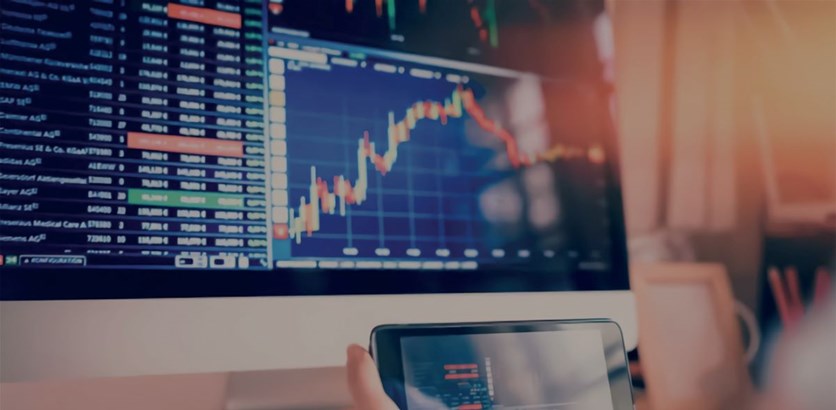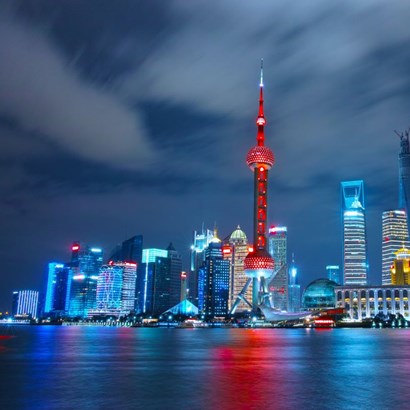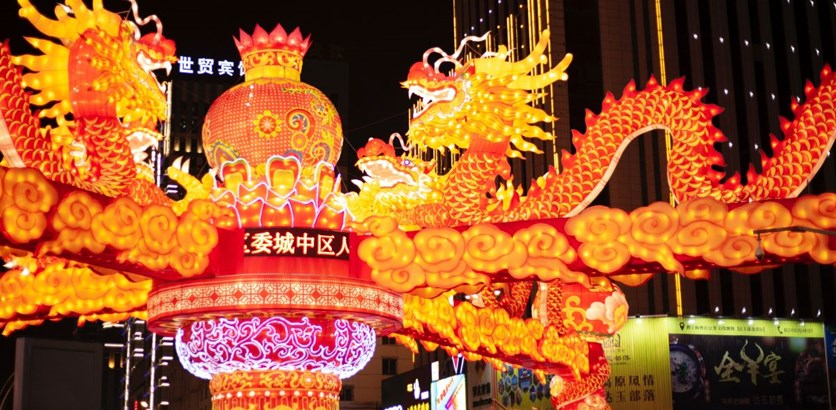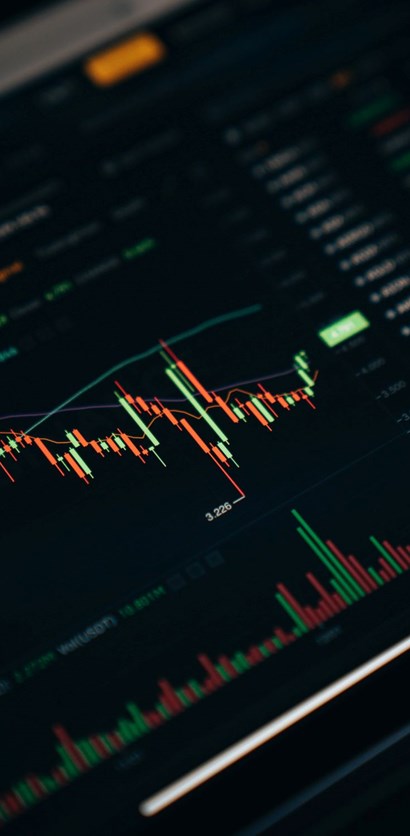Investors face tough choices which will impact their returns for years to come. In this time of crisis, there are important lessons for us all in how to deal with the unexpected.
In any crisis, be like “Captain Cool”
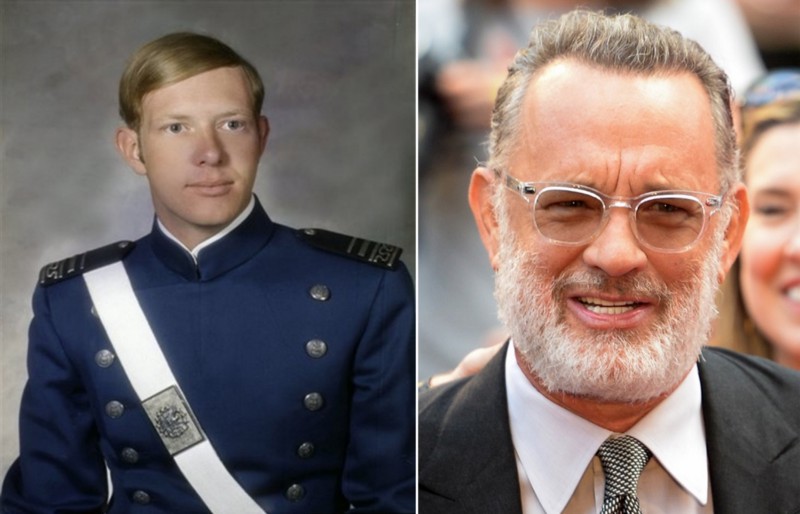
What can Tom Hanks and a retired US Air Force pilot teach us about making investment decisions during a time of crisis? Quite a lot, as it happens.
In his 2016 film ‘Sully’, director and producer Clint Eastwood cast Tom Hanks to play the real-life hero Captain Chesley Sullenberger. The movie portrays the events of January 15th 2009 and US Airways Flight 1549 which, just 3 minutes after taking off from New York’s LaGuardia Airport and at the meagre altitude of 850 metres, suffered multiple bird strikes which disabled both of the aircraft’s engines. The hero of this story, Captain Sullenberger, was in command of the aircraft that fateful day.
Captain Sullenberger had seconds to make a decision and the survival of his 155 passengers and crew depended on him making the right call. He decided to ditch the aircraft in the Hudson River, correctly determining that with no functioning engines he could not make it to the nearest runway. The successful landing on the Hudson River saved the lives of everyone onboard. Captain Sullenberger is rightly considered a hero and his actions that day offer us mere mortals an important lesson in how to respond to a crisis.
Poise and calm in response to the unexpected is the lesson for us in the investment community today. The Mayor of New York at the time of the aforementioned incident, Michael Bloomberg, dubbed Captain Sullenberger: “Captain Cool”. In the face of any crisis, whether in the investing world or our personal lives, we should all be more like “Captain Cool”.
In the face of grave danger and with the costs of a mistake being so high, Captain Sullenberger remained calm. He did not panic, he assessed his options and he made a decision based on the evidence available to him. Critically, he did not react emotionally to the crisis he found himself in. His calm response to crisis made the difference between survival and the unthinkable.
COVID-19 has presented the investment world with the gravest crisis in confidence and market volatility since the Great Financial Crisis, perhaps even since the 1929 Wall Street Crash and subsequent Great Depression. In the face of this crisis, investors are under pressure to make the right decision. The downside risk of making the wrong decision is high. We all need to be more like “Captain Cool”.
What Does Making the Wrong Decision Look Like for Investors?
A disproportionate amount of investment returns to equity investors come from having exposure to a small number of very positive trading days in equity markets. Let us say that again, because it’s extremely important. Over a long-term time- horizon, missing just a few of the highest return days in equity markets can have a dramatic negative effect on investor portfolio returns.
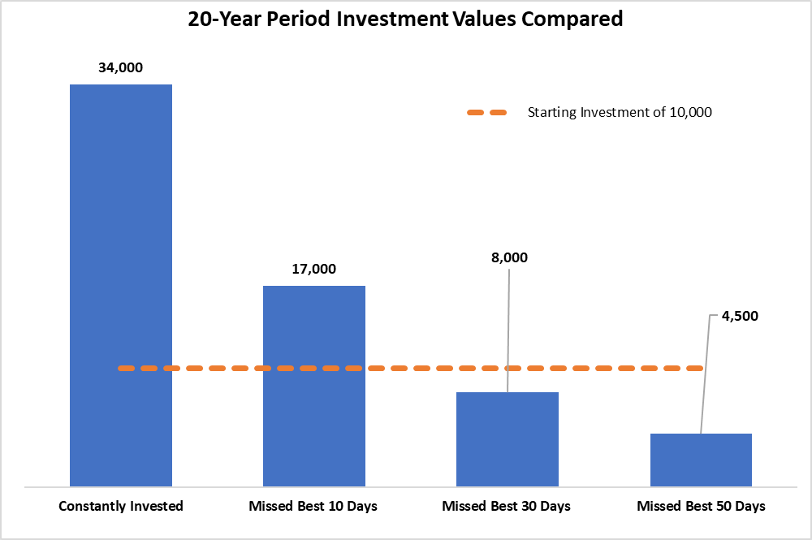
The chart above shows the output from an investment experiment to illustrate this. Starting with an investment of £10,000 in equity markets over a 20-year time horizon, the chart shows the ending portfolio value for investors who remained invested in equities for the entire period (portfolio returns +340%) versus investors who were invested for the entire period, but who were not invested for short periods of just a few days (assuming those days were high return days).
Even the investor who only missed the best 10 days of returns in the 20-year period was still 50% worse-off than the investor who remained fully invested over the entire period. Missing just 30 of the best days for returns in a 20-year period was enough to push the portfolio returns negative.
In the face of a crisis that dramatically impacts asset prices, investors are faced with a time critical decision. What do you do? It is easy to react emotionally to a crisis and feel the need to “do something”, to reduce exposure to equities and wait for a recovery. But the evidence is clear. Investors, when faced with a market crisis, must remain cool, calm and have the courage to remain fully invested in equities. Missing the strongest days for equity returns (there aren’t many of them and they usually follow market sell offs!) can have a dramatically negative impact on investment returns.
Time to Switch off the Autopilot?
Flight 1549 and “Captain Cool” offer us another lesson during the COVID-19 crisis and beyond. When a situation is volatile and a crisis is presented to a pilot, a successful outcome requires the pilot be in full control of the aircraft. It is no time for the ‘autopilot’ to be switched on.
Computers are great at handling tasks when outcomes are easy to predict. For an aircraft in safe and level flight, a computer can handle the task at hand: keep the aircraft flying in a straight-line. For equity investors during times of low volatility and predictable economic growth, a computer can easily handle many investing requirements through ETFs or passive funds. During a crisis, for pilots and investors alike, automated systems fail and with disastrous consequences. Human expertise is needed to avert crisis and for investors, now is potentially the most important time in decades to have human expertise managing their equity market exposure.
The past decade was characterized as one in which it was better to own index tracking funds managed largely autonomously. Own a bit of everything in the equity market because everything is going up. Capital invested in passive equity funds at the start of 2020 was at record levels as a proportion of total capital under management. Investors would be forgiven for thinking this is a new normal for financial markets, that this is just the way things are now and passive will continue to be the best way to earn returns in equities.
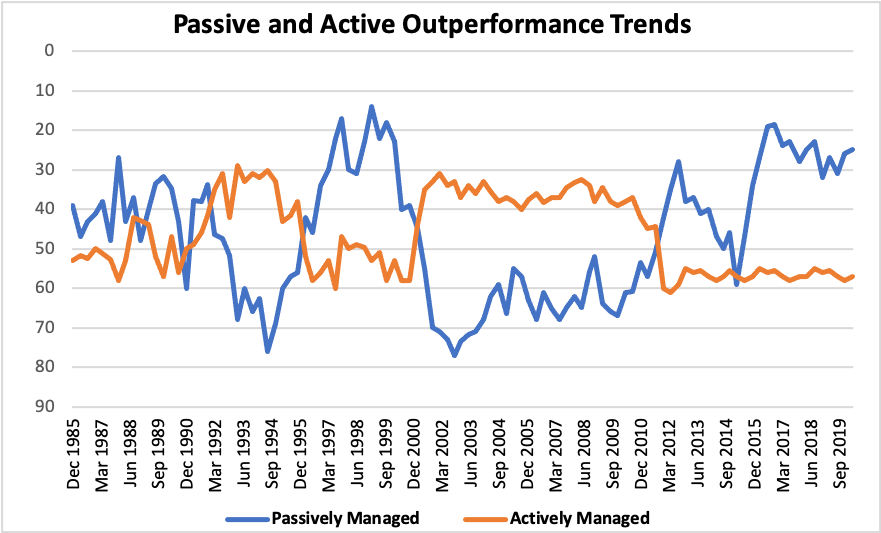
However, if we look at the period 1999 – 2008 in the chart above (the decade preceding 2009 – 2019) we see a very different picture. In that decade, actively managed equity strategies outperformed passive funds in 8 years out of 10. Investors were much better off between 1999 and 2008 investing their capital in active equity funds. If we look back over an even longer period, we find that the relative performance of active versus passive investment strategies is cyclical.
We have lived through multiple periods of passive equity strategies outperforming active strategies, the most recent decade was one of those periods. But these periods are typically followed by the reverse. Long periods of active equity investment strategies outperforming passive strategies. With the COVID-19 pandemic triggering the highest volatility in markets on record, many active funds (like Dominion’s) are now outperforming passive funds significantly in 2020. The fuel which powered passive fund outperformance over the past decade has run out. We are very likely moving into a new and sustained period of active equity strategies outperforming passive strategies.
Time to switch off the autopilot
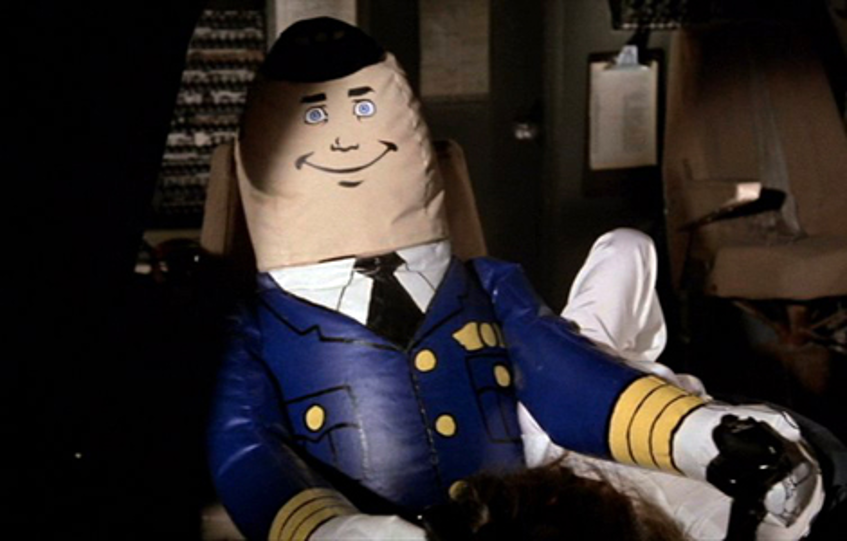
This is no time for investor portfolios to be stuck on autopilot. The passive outperformance wave is likely coming to an end and through a time of crisis and great uncertainty, the optimal investment decision, in our view, is for investors to rely on the expertise of active managers.
Long-term, high-quality, high-growth business models, with strong balance sheets and excellent management teams will weather this crisis. At Dominion, our portfolios invest exclusively in companies with these powerful attributes. We have remained calm in the face of the COVID-19 crisis and continue to implement our long-term investment strategy for the long-term benefit of investors.




